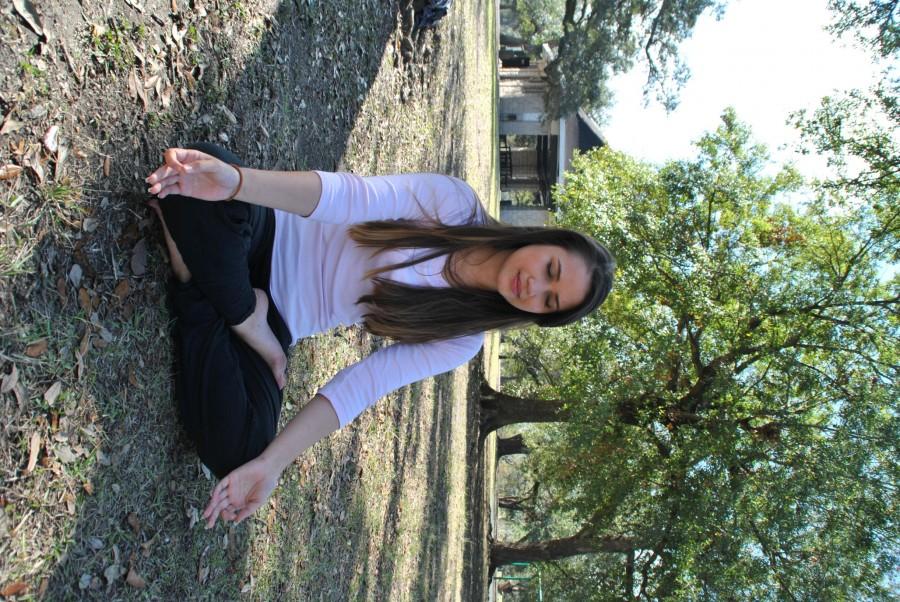Inspired by the Beatles and their practice of transcendental meditation, Kathy Anzelmo began her journey in meditation, and today it has become a part of her courses at Loyola.
According to Anzelmo, instructor of biological sciences, the trend at Loyola can be traced back to the late Rev. Ben Wren, S.J., a former professor of two popular Zen meditation courses.
Citing Wren as inspiration and with 22 years of practice herself, Anzelmo is one of several professors at Loyola who have included meditation in their courses.
“I snuck meditation in the course because although it’s not traditional biology, it does have a biology component to it,” she said, referring to her Cultural Biology course.
Similarly, Associate Professor of Philosophy Francis Coolidge was inspired by Wren, and he uses a meditation component as a service to students.
“I also decided to include it in service of self-knowledge,” Coolidge said. “It encourages a greater capacity to lead lives of wholeness, and it’s in line with Loyola’s mission.”
Coolidge, who began practicing meditation 25 years ago, describes it from a philosophical perspective as the bridge between our unconscious and ordinary thoughts. It has the power to completely change one’s life perspective, and it does not necessarily have to be linked to a religion or set of beliefs.
“It goes back to Socrates, to ‘know yourself.’ It’s the most powerful way of developing self-awareness,” he said. “It’s a process of self-inquiry.”
In light of this being a flexible practice, Anzelmo teaches several forms. Her course briefly reviews traditions such as acupuncture and more extreme forms such as Tibetan meditation, which involves eight-hour long sessions in both steam and snow. Modern methods include a type practiced during TV commercials and kinesthetic types such as yoga.
Yoga is particularly popular among college students like Justine Sundrud, a biological sciences junior who regards the practice as life-changing. Aside from citing her father as inspiration, she also cites her Liberation Theology course, taught by Alvaro Alcazar, director of Urban Partners for the Twomey Center for Peace Through Justice.
“It’s all changed my whole lifestyle. I’m more aware of what I’m doing and eating and how I’m interacting with people,” Sundrud said. “I do it whenever I can and usually the night before a test.”
According to University Counseling Center staff counselor Alison Cofrancesco, students can suffer from anxiety that stems from academics, finances, relationships and defining moral values. “Meditation can be helpful in reducing that anxiety and can encourage acceptance of the present rather than regretting the past or fearing the future,” she said.
Like Cofrancesco, psychology freshman Codie Maxwell, who has practiced meditation for three years, believes it can help students with life decisions.
“There are many different paths we can take, many philosophies we can live by, and people have trouble figuring out what they want,” Maxwell said. “We’re always clouded by other people’s judgments, and meditation helps tune them out and seek into yourself to figure out what you want and how you want to achieve it.”
Anzelmo also regards the practice as beneficial for students, noting the mental and physical benefits. “It can help students concentrate better for studying. It’s like a nap,” she said. “You become more focused because it’s more quiet inside of you.” Some of the benefits she mentions are: a decrease in heartbeat, respiration rate, blood pressure and pain. It boosts the immune system and rewires the brain to reduce stress. It also increases endorphins, the “feel-good” chemicals of the brain.
Aside from being available through courses, a meditation gathering called “Centering Prayer” has been offered since this past summer and is led by Ricardo Marquez, the Jesuit Center’s assistant director for faculty and staff development. Marquez notes this is not a strictly religious event.
“This is not reduced to the Catholic tradition. Any concreteness of god isn’t god. You can connect from different languages and traditions,” he said. “It’s cultural disarmament.”
Every Tuesday at 12:35 p.m., Marquez begins with thoughts attributed to people from different backgrounds such as Lao-Tzu, Mohammed, Buddha, Jesus, Gandhi and others. Along with other Loyola practitioners, he agrees the practice serves to encourage self-awareness and highlights that there is no definite way to meditate.
“It has very profound effects on you. You’re more compassionate to yourself and learn to accept yourself as you are, healing yourself and surpassing your critics and inner judges,” he said. “It’s not a formula, it’s not the seven habits of life to be happy. It’s a journey to walk with more consciousness.”
Like Marquez and Coolidge, Anzelmo recommends doing the practice for at least 20 minutes twice per day in a quiet environment. She said the more one does it, the easier and more beneficial it becomes.
“If you’ve done it enough you can do it in the middle of Grand Central Station in New York,” she said. “You learn to tune it all out.”






